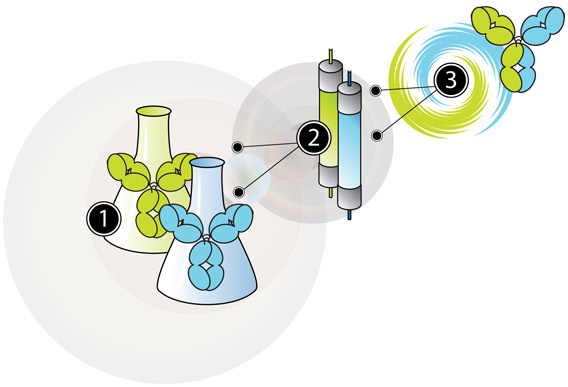
Abbvie and Genmab team up in oncology
AbbVie is partnering with Genmab A/S to commercialise up to seven new antibody formats.
Under the licence agreement, AbbVie will pay Genmab US$750m upfront and up to US$3.15bn in potential milestones. In addition to co-developing three of Genmab’s early-stage investigational bispecific DuoBody antibody product candidates (epcoritamab, DuoBody®-CD3xCD20; DuoHexaBody®-CD37 and DuoBody®-CD3x5T4), the companies agreed to enter into a discovery research collaboration for developing future antibody therapeutics against cancer.
Under the discovery research collaboration, the new partners will combine Genmab’s DuoBody technology and AbbVie’s ADC technology to develop up to four additional antibody conjugates, potentially across both solid tumours and blood cancers. Genmab’s DuoBody-CD3 technology engages and directs cytotoxic T cells to selectively activate an immune response towards malignant cells. AbbVie’s ADC technology allows the selective delivery of a highly toxic compound directly to cancer cells that overexpress specific surface markers. The companies said this combined strategy may allow designing effective cancer therapies with fewer side effects.
For epcoritamab, companies will share commercial responsibilities in the U.S. and Japan, with AbbVie being responsible for the global commercialisation. Genmab will book net sales in the U.S. and Japan and receive tiered royalties on remaining global sales. For DuoHexaBody-CD37, DuoBody-CD3x5T4 and any product candidates resulting from the companies’ discovery research collaboration, Genmab and AbbVie will share responsibilities for global development and commercialization in the U.S. and Japan. Genmab retains the right to co-commercialize these products, along with AbbVie, outside of the U.S. and Japan. For the discovery research partnership, Genmab will conduct Phase 1 studies for these programmes. AbbVie retains the right to opt-in for programme development
Upon market approval of Genmab’s product candidates, Abbvie will pay tiered royalties between 22% and 26% on net sales for epcoritamab outside the U.S. and Japan. Except for these royalty-bearing sales, the parties share in pre-tax profits from the sale of products on a 50-50 basis. These potential milestones are up to US$1.15bn in payments related to clinical development and commercial success across the three existing bispecific antibody programmes. Furthermore, if all four next-generation antibody product candidates developed as a result of the discovery research collaboration are successful, Genmab is eligible to receive up to US$2bn in option exercise and success-based milestone payments.




